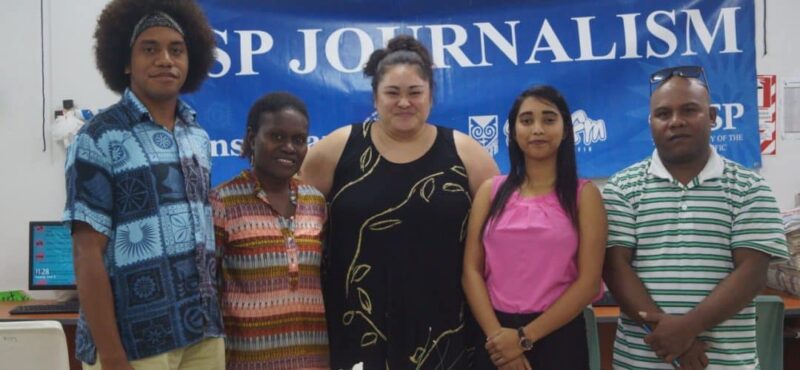Although global attention on the impacts of climate change on the Pacific region still lags, two of the organizations being supported by Internews’ Earth Journalism Network (EJN) to enhance climate change reporting in the region have been stepping up.
The Pacific Environment Journalists Network (PEJN), founded in November 2017 with funding from EJN, has started a regular newsletter to keep members and supporters aware of media-related news in the region. They are also a way to generate public conversation about the environment and increase coverage of environment topics in the Pacific-based media.
In its latest edition, PEJN highlighted recent training workshops for journalists on climate change resilience and finance, both of which led to coverage of international meetings on those topics. The network’s Tonga members are also planning climate change media and communications trainings in Nuku’alofa in August and November.
PEJN currently has around 50 members and continues to support training workshops for environmental journalists across the region, something reporters there say is greatly needed.
Jared Koli, a journalist from the Solomon Islands currently studying at the University of the South Pacific who was part of their Climate Finance Masterclass, told PEJN that “platforms that support knowledge sharing [such as workshops and online tools] are important in promoting a community of practice and collaborative environment in the Pacific.”
The University of South Pacific (USP) is another EJN grantee this year, and in early July a group of its students returned from a week-long trip to the Solomon Islands, where they reported on how communities are adapting to the effects of climate change and sea-level rise.
“We visited vulnerable communities in the greater Honiara area, spoke to those at the forefront of climate change, those in resilience and adaptation projects, those suffering from the devastating impact of climate change, those in decision-making positions and the future generation,” Geraldine Panapasa, trip leader and editor of USP’s independent student newspaper, Wansolwara, told Asia Pacific Report.
She said the students found that unlike some other Pacific islands, climate change does not get much exposure in the Solomon Islands, with government agencies usually supplying environmental reports to newspapers, rather than journalists doing the reporting themselves.
Funded through EJN’s Asia-Pacific 2019 media grants program, the USP project aims to provide students with access to on-the-ground environmental reporting experience, helping better position them to cover an increasingly important issue in the future.
“Environmental issues in the Pacific are under-reported compared to the magnitude of the problems and because of the smallness of the Pacific media industry, journalists are generalists by necessity, with no specific beats such as environmental journalism,” USP Journalism Coordinator Dr Shailendra Singh told Wansolwara last month.
The grant from EJN, he said, “would take authentic learning – the idea of incorporating the classroom with the real world – to another level.”
Another team of USP students is scheduled to visit the Cook Islands on a similar assessment later in the year.
(Banner photo: Journalism students at USP who participated in the visit to the Solomon Islands (from left to right) Epeli Lalagavesi, Rosalie Nongebatu, Geraldine Panapasa (USP Journalism staff), Romeka Kumari and Ben Bilua / Credit: Eliki Drugunavlevu)
